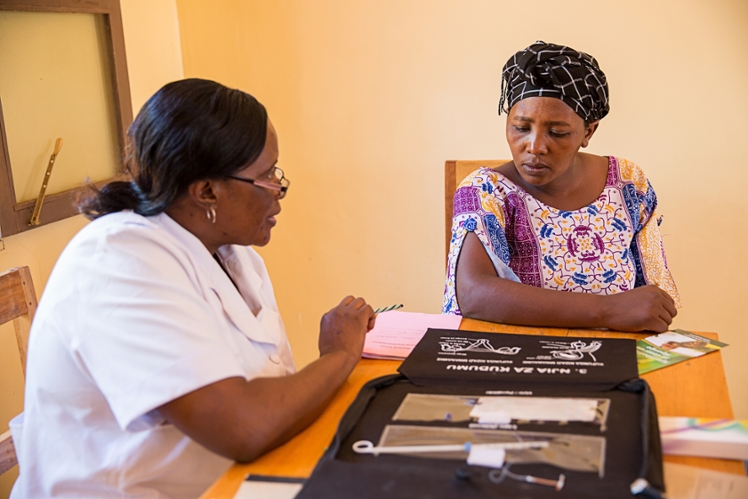When I think about how far the global family planning (FP) community has come since the first International Conference on Family Planning (ICFP) in 2009, I am amazed by the progress to date. Like many of my colleagues in the field, we have seen significant momentum since FP2020 and increased resources toward improving women’s access to FP.
Equally critical to achieving the FP2020 goal of reaching 120 million new FP users, however, is how efforts are undertaken. That is why EngenderHealth, along with its partners, has taken deliberate steps toward ensuring that FP services are designed, implemented, and monitored in a way that protects women’s rights and puts their needs, desires, and preferences at the center.

To achieve a vision of client-centered care, FP programs must offer contraceptive choice, which still remains elusive in many settings. This is especially the case in poor contexts with limited and/or no access to long-acting reversible contraceptives (LARCs) and/or permanent methods. Fortunately, as a result of FP2020, donors and pharmaceutical companies launched the Implant Access Program (IAP), which guarantees a 50% reduction in the prices of Jadelle®, Implanon®, and Implanon NXT® through 2018.*
The reduction in cost for contraceptive implants—a previously less-accessible yet highly effective FP option—was a major step toward making this method more available and affordable in low-resource settings. It helped paved the way to initiate a new project—Expand Family Planning, or ExpandFP—which aims to increase access to and use of FP, with a focus on hormonal implants and in a context of voluntarism and informed choice. Led by EngenderHealth with support from the Bill & Melinda Gates Foundation, the project is building the capacity of public-sector FP systems to offer hormonal implants in Tanzania, Uganda, and the Democratic Republic of the Congo (DRC)—countries with high unmet need for FP.
Since 2013, ExpandFP, in partnership with ministries of health, has made measurable contributions toward supporting FP2020 goals, benefiting from the IAP price reductions, and expanding FP options. For example, the project has seen an extraordinary shift in method mix in project-supported services, most notably for implants.
In addition to providing technical assistance, EngenderHealth undertook a study to assess client perceptions of quality and choice in FP service delivery as part of ExpandFP. Study highlights show:
- The level of overall satisfaction with FP services was extremely high.
- A large majority of women who wanted contraception came to the clinic with a method in mind.
- Women in all three countries were very informed about all methods; in fact, a majority of clients overall stated they received “too much information” on FP, while fewer than 10% in each country stated they received too little.
- Overall, clients were highly satisfied with the services they received, regardless of the type of service modality used or FP method chosen. They received the methods that they wanted, with all of the information that they needed to choose and use contraception to meet their reproductive intentions.
- Lastly, mobile outreach services are important to women, since they can receive all methods close to home, even in remote areas or at clinics where these methods are not routinely available.
The experiences in Tanzania, Uganda, and the DRC demonstrate that global commitments coupled with local actions can achieve positive results. There is much to build on in terms of progress—and there must be continued investment by governments and donors to achieve sustainability, for the health and well-being of women and families today and for generations to come.
If you are attending ICFP, visit us on Tuesday, January 26, 10 am–1:20 pm, for the poster presentation “Putting choice and rights at the center: Results from a family planning client survey in the Democratic Republic of the Congo, Tanzania, and Uganda.” If you cannot join us at ICFP, visit https://www.engenderhealth.org/our-work/major-projects/EXPAND-FP_Brief_3-countries.pdf for more information about interim results from the ExpandFP project.
*Bayer and RHSC (Reproductive Health Supplies Coalition) recently announced an extension of the low prices for implants until 2023.



I admire the work of the team. Thank you for all the hardworking and effort. Respect.
instagram hashtags
Believe it or not your test composing limits has roused me to start my own blog now. All things considered the blogging is spreading its wings rapidly. Your audit is a fine instance of it. This phenomenal article has genuinely peaked my bit of leeway. I am astoundingly vivacious to investigate this article. I like what I see so I am essentially following you. Envision researching your site page again. I’m going to book mark your webpage and keep checking for your blog. Continue with this Write my Essays, for creative tips.
Impressive work on translating global family planning commitments into local action. How can we further support this crucial initiative?